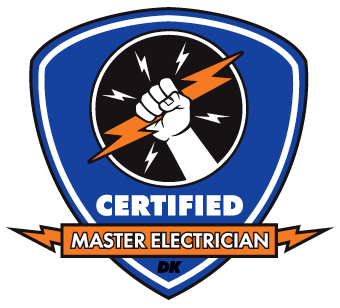You’re right to be concerned about flickering lights on the inside or around the exterior of your home. That may or may not be a problem that you can safely ignore. Lights flickering in houses frequently or persistently can indicate serious electrical problems that put homes and families at extreme risk of electrocution or house fires. Below is a list of common causes of flickering lights in homes and suggested actions to ensure home safety.
Possible Causes of One, Several, or All Lights Flickering in Your House
If you’re experiencing rare instances of just one or a few lights flickering, there may or may not be a cause for concern. If lights throughout your entire home are frequently flickering, that may be due to one of a different set of potential causes that are possibly more problematic.
Individual or Multiple Lights Flickering
Are flickering lights dangerous? Here are the most common causes of one or several lights flickering and dimming in house sockets occasionally. These causes may or may not lead to serious consequences if left unattended. But, they may be less likely to put a home at high risk than broader issues with lights frequently flickering throughout the home:
Types of Light Bulbs
Fluorescent bulbs may flicker when turned on in a cold room in winter or as the lights are powering up. To stop this, consider switching those to another kind of light bulb. Another example is using LED light bulbs with dimmers designed for incandescent bulbs. Only use compatible dimmers with LED bulbs.
Loose Connection
If flickering increases, loose wiring may be the cause. It may be due to incorrect light installation, outdated wiring, or worn-out wiring or connectors. This may be a serious problem. Any loose electrical connection is a fire hazard. There is a dangerous potential for it to cause arcing and overheating. Consider having a professional install ceiling light fixtures instead of DIY, and call a certified electrician for prompt attention to the problem if you find a loose connection.
Loose Light Bulb
Loose light bulbs that aren’t screwed into the sockets properly don’t get a steady supply of electricity. To correct this easy problem, just turn off the light and wait for the bulb to cool down, then screw in the bulb until it is more appropriately snug in the socket.
Overloaded Circuit
If your lights flicker when you turn on electric appliances, an overloaded circuit may be causing the flickering. That’s because the appliances draw considerable amounts of electricity as they start up. If the flickering is frequent or persists for longer than several seconds, you may need to install upgraded electrical circuits in the affected areas of your home.
Voltage Changes
Electrical voltage in your home should not fluctuate outside the range of 115 to 125 volts. Fluctuations outside these parameters require diagnosis by a certified electrician. Indicators of extreme fluctuation of voltage can include:
- Lights that go dim unexpectedly
- Light bulbs burning out sooner than they should
- Dimming or flickering lights when you turn on large home appliances
- Continued flickering after an appliance is switched off
- Home appliances or electronic devices shutting down prematurely
- Appliances or electrical devices malfunctioning
Lights Flickering in the Entire House
Flickering lights throughout the house should be promptly examined by a certified electrician. Issues with wiring or connections can present shock hazards. They can also impact circuit breakers and other electrical safety equipment. Frequently flickering lights throughout a whole house may be caused by:
- Poorly connected wiring
- Strong winds, electrical storms, or other weather events
- Faulty, worn, or corroded wires or connectors
- Service conductors that are loose in the electrical box
Electrical switches, breakers, appliances, and meters need clean and properly attached surface contacts between conductors.
Electric Company Issues
Why do my lights flicker at certain times? If you suspect that the electric company itself may be the cause of lights flickering in your home, consider asking neighbors if they are having similar issues. If so, there may be a nearby faulty transformer, or peak hours may be causing a drain on the systems in some regions. You should ask your utility company or a licensed electrician to investigate the problem and determine whether it presents a safety hazard.
Flickering Lights and Electrical Safety
Ignoring flickering lights without knowing the cause of the problem can lead to deadly electrocution or a devastating house fire. When you discover the issue, contact a licensed electrician for a diagnosis to ensure that your wiring and breakers are working safely.
DK Electrical Solutions Resolves Electrical Hazards
Where is there an electrician near me? DK’s friendly Master Electricians in Southampton, New Jersey, can promptly and thoroughly diagnose your electrical issue and clearly explain your options for repair or upgrade if needed. We detail all costs upfront, so there are never any surprises after the work is completed.
For troubleshooting flickering lights in your home, call DK Electrical Solutions at (609) 796-4177, or contact us here online to schedule an assessment and estimate!
Download PDF
